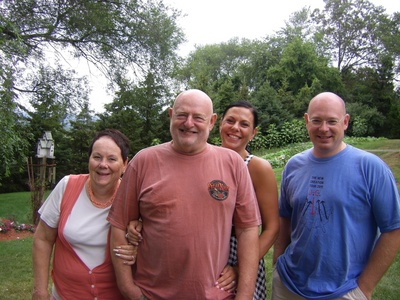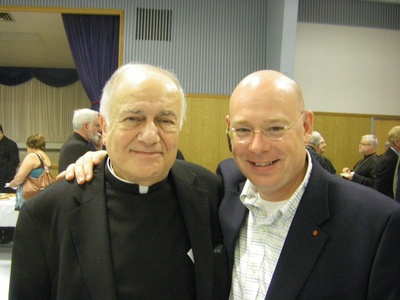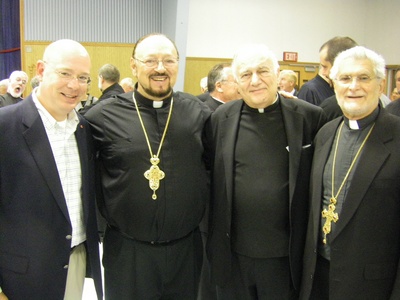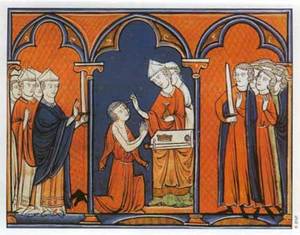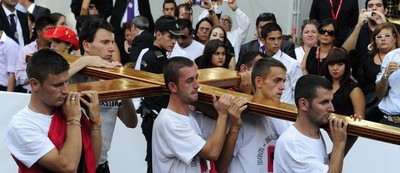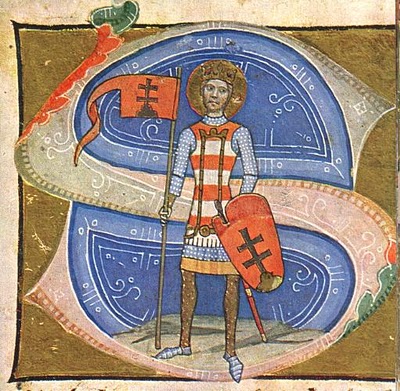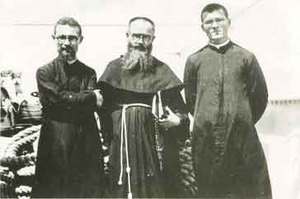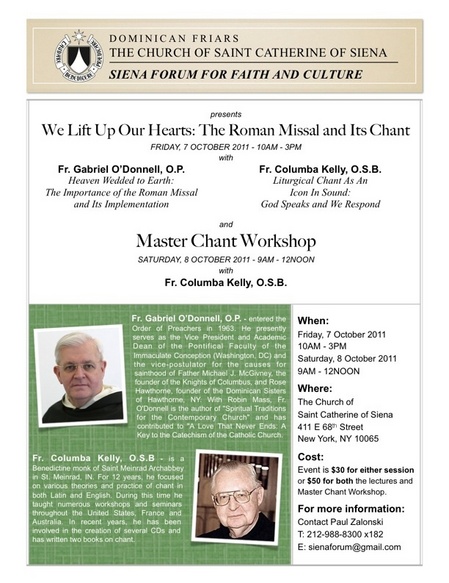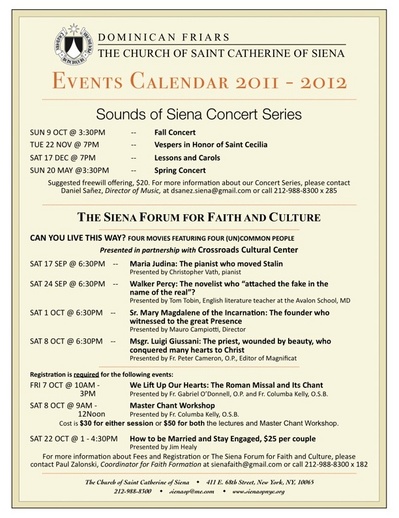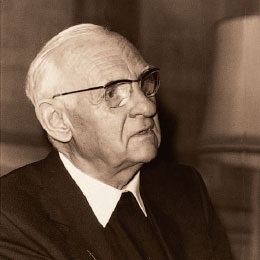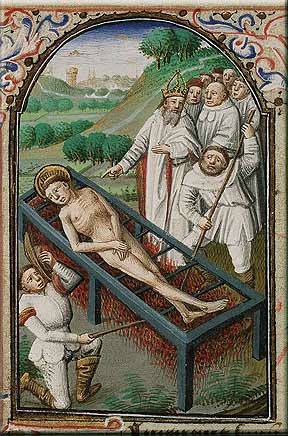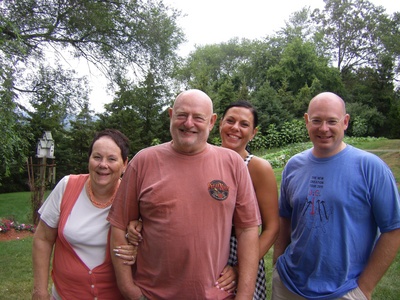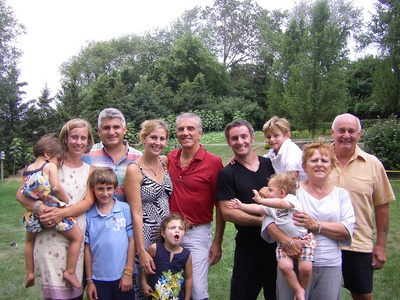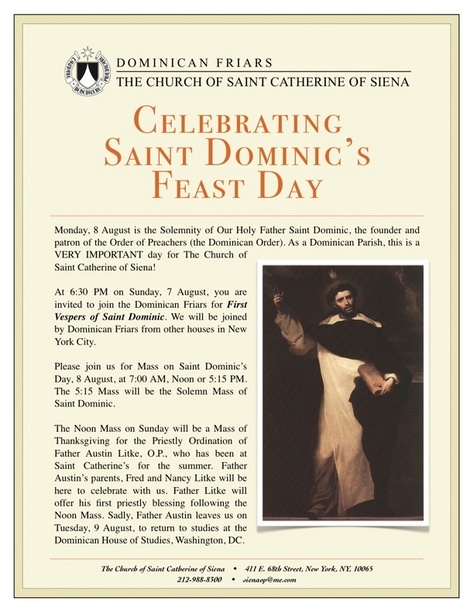August 2011 Archives
Today's feast is probably of a little known saint, Saint Jeanne Jugan (1792-1879). Her's a remarable life of grace and heroic virtue.
"...Jeanne Jugan was concerned with the dignity of her brothers and sisters in humanity whom age had made more vulnerable, recognizing in them the Person of Christ himself. "Look upon the poor with compassion," she would say, "and Jesus will look kindly upon you on your last day." Jeanne Jugan focused upon the elderly a compassionate gaze drawn from her profound communion with God in her joyful, disinterested service, which she carried out with gentleness and humility of heart, desiring herself to be poor among the poor. Jeanne lived the mystery of love, peacefully accepting obscurity and self-emptying until her death. Her charism is ever timely while so many elderly people are suffering from numerous forms of poverty and solitude and are sometimes also abandoned by their families. In the Beatitudes Jeanne Jugan found the source of the spirit of hospitality and fraternal love, founded on unlimited trust in Providence, which illuminated her whole life. This evangelical dynamism is continued today across the world in the Congregation of Little Sisters of the Poor, which she founded and which testifies, after her example, to the mercy of God and the compassionate love of the Heart of Jesus for the lowliest. May Saint Jeanne Jugan be for elderly people a living source of hope and for those who generously commit themselves to serving them, a powerful incentive to pursue and develop her work!
Pope Benedict XVI
Canonization homily
11 October 2009
A feast day slide show done by the Little Sisters of the Poor. You can read more about Saint Jeanne Jugan here.
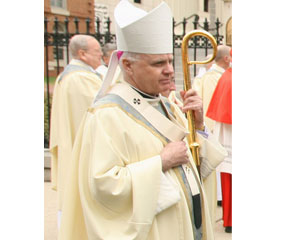 It sounds like this appointment of Archbishop Edwin F. O'Brien, 72, to head the 1000 year old lay group Equestrian Order of the Holy Sepulchre of Jerusalem.
It sounds like this appointment of Archbishop Edwin F. O'Brien, 72, to head the 1000 year old lay group Equestrian Order of the Holy Sepulchre of Jerusalem.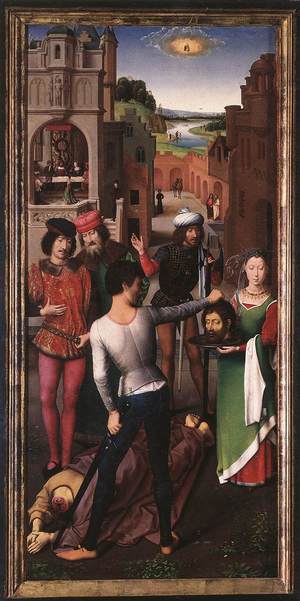 O God, who willed that Saint John the Baptist should
go ahead of your Son both in birth and in death, grant that as he died a Martyr
for truth and justice, we, too, may fight hard for the confession of what you
teach.
O God, who willed that Saint John the Baptist should
go ahead of your Son both in birth and in death, grant that as he died a Martyr
for truth and justice, we, too, may fight hard for the confession of what you
teach.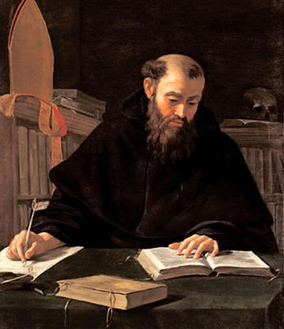 Christ humbled himself, you have something, Christian,
to latch onto. Christ became obedient. Why do you behave proudly?
Christ humbled himself, you have something, Christian,
to latch onto. Christ became obedient. Why do you behave proudly? 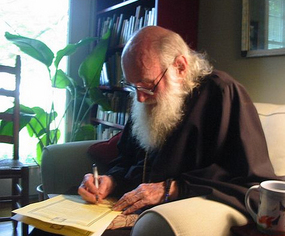 Very early this morning, Archbishop Dmitri, 87, emeritus archbishop of Dallas and the Diocese of the South, died after failing health.
Very early this morning, Archbishop Dmitri, 87, emeritus archbishop of Dallas and the Diocese of the South, died after failing health.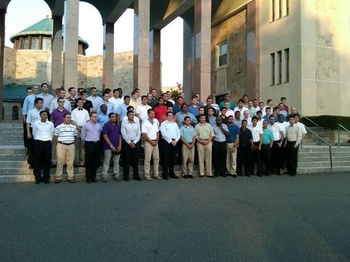 Back to school. This year three New York dioceses are combining their undergraduate and pre-theology programs. The Archdiocese of NY has moved with the Brooklyn and Rockville Centre Dioceses in Douglaston (Queens), New York.
Back to school. This year three New York dioceses are combining their undergraduate and pre-theology programs. The Archdiocese of NY has moved with the Brooklyn and Rockville Centre Dioceses in Douglaston (Queens), New York.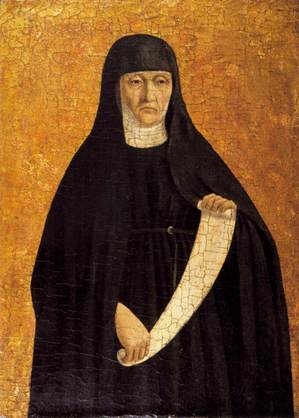 And when the Lord saw [the mother of the deceased
young man], he had compassion on her and said to her, 'Do not weep.' And he
came and touched the bier, and the bearers stood still. And he said, 'Young
man, I say to you, arise.' And the dead man sat up, and began to speak. And he
gave him to his mother" (Luke 12:13-15).
And when the Lord saw [the mother of the deceased
young man], he had compassion on her and said to her, 'Do not weep.' And he
came and touched the bier, and the bearers stood still. And he said, 'Young
man, I say to you, arise.' And the dead man sat up, and began to speak. And he
gave him to his mother" (Luke 12:13-15).
My friend Michel wrote to tell me that Sofia Cavalleti last evening. You may remember that a few days ago I asked you to include Sofia in your prayers. This past Sunday, Sofia celebrated her 94th birthday. I once again recommend to you the soul of Sofia Cavalletti to the Lord, the Good Shepherd of our souls.
The following is the message sent out by the Catechesis of the Good Shepherd USA board:
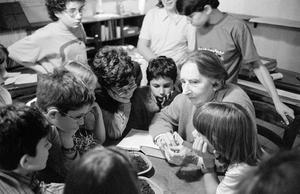
With tears and with peace, we want to share with you that our beloved Sofia Cavalletti, at 94, a founding mother of the Catechesis of the Good Shepherd, has entered the celestial pasture of the Good Shepherd. There is great rejoicing in heaven for her with Gianna, Tilde, Fr. Mongillo, Maria Christleib and Tina, along with members of her family who have gone before her.
Francesca Cocchini sent the following announcement from Rome, Italy: "Dearest, this is only to say that during this night - at ten after midnight (Tuesday, August 23) Sofia encountered the Good Shepherd face to face." The funeral Mass will be on Wednesday, August 24.
An interesting and unique anniversary is being observed by a member of the College of Cardainls: Ján Chryzostom Korec, SJ, the emeritus bishop of Nitra (Slovak Republic), 87, Bishop Pavel Hnilica ordained the cardinal secretly in a hospital room.
The cardinal is an exceedingly interesting man. When I met him in 1997 when he was making a US tour of Slovak communities, his interaction among his hosts was wonderful. He received an honorary Doctorate from Sacred Heart University on that visit to Connecticut.
Cardinal Korec's statistics are fascinating: nearly 61 years a priest, 60 years a bishop and 20 years a cardinal.
Here's the Pope's congratulatory message:
Venerabili Fratri Nostro
IOANNI CHRYSOSTOMO S.R.E. Card. KOREC, S.I.
Episcopo emerito Nitriensi
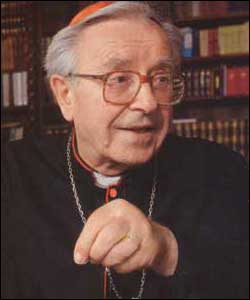
Laeti laetum nuntium accepimus quod tu, Venerabilis Frater Noster, sexagesimam propediem anniversariam celebrabis memoriam illius diei semper tibi recolendi, quo Episcopus consecratus es et inter Apostolorum Successores relatus, huius nominationis occulte nactus honorem.
Quemadmodum tam felicis nec non praeclari eventus ratio poscit, Nos, commemorantes ministerium sacrum quod diligentissime tot annos peregisti, te actuosum, fidelem ac prudentem Pastorem enixe laudamus praesentiamque spiritualem Nostram hac in festivitate tibi pollicemur.
Dum ergo flagrantia vota, quaecumque sunt salutaria, optabilia, fausta adprecantia, imo e pectore promimus, a sanctissimo ac sempiterno Deo tibi supernorum munerum copiam imploramus, quorum auspicium simul atque propensae voluntatis Nostrae pignus esto Apostolica Benedictio, quam tibi amantissime impertimus.
Ex Arce Gandulfi, die XV mensis Augusti, in Sollemnitate Assumptionis Beatae Mariae Virginis, Anno MMXI, Pontificatus Nostri septimo.
BENEDICTUS PP XVI
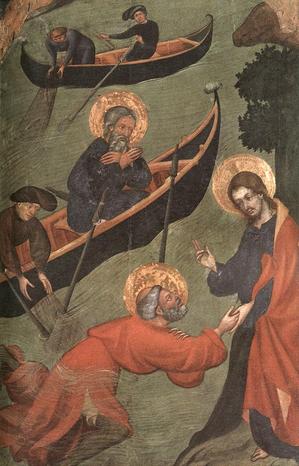 Jesus invited us to meet. Saint Benedict's talked about it; a plethora of saints have talked about it; Fr Giussani constantly talked about it; Pope Benedict XVI talks about it: nothing can substitute for personally knowing Jesus. Want to be a Christian? Go and meet Christ in Scripture, in the Holy Eucharist, in personal and communal prayer, in doing good works. In short, meet Jesus Christ by the ears of your heart and in your minute by minute human experience.
Jesus invited us to meet. Saint Benedict's talked about it; a plethora of saints have talked about it; Fr Giussani constantly talked about it; Pope Benedict XVI talks about it: nothing can substitute for personally knowing Jesus. Want to be a Christian? Go and meet Christ in Scripture, in the Holy Eucharist, in personal and communal prayer, in doing good works. In short, meet Jesus Christ by the ears of your heart and in your minute by minute human experience.What, dear brothers, is more delightful than this voice of the Lord calling to us? See how the Lord in his love shows us the way of life. Clothed then with faith and the performance of good works, let us set out on this way, with the Gospel for our guide, that we may deserve to see him who called us to his kingdom (RB, Prologue, 20-1).
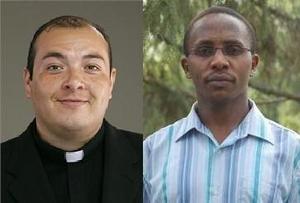 From my friend, Father Frowin, I learned of this tragic news:
From my friend, Father Frowin, I learned of this tragic news: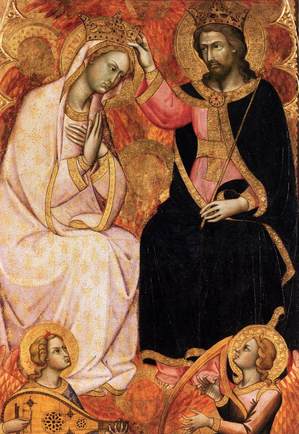
Queen of Heaven means Queen of Earth, Queen of the Truth of earth, of earth in its permanent truth, because veritas Domini manet: the truth of Being endures.
The wait for Christ's return-and each of us is called to experience this-is the passion and the joy, the joyous hope for that day when all the world will be truly itself, all mankind will acknowledge Him, and Christ will truly be "everything in everyone." That moment is the meaning of everything that is, the meaning of the whole of time, of all that we do, and the apex, the heart of hope, because man's glory depends on this; in this adherence man begins to cry out God's glory. Our life seeks glory because it is made for this. Glory is not something promised for the future, but is a promise already begun and already fulfilled. To the extent that we offer ourselves and acknowledge that the substance of everything is Christ, this promise is accomplished for us. Paradise is not somewhere else; it will be here. Paradise is the total truth between you and me, in the relationship between you and me; it is the total truth in the relationship between me and the image that comes to me through thought, between me and things. Paradise is a feast which "fulfills every feast the heart has desired."
May the hand of Our Lady introduce us into the Mystery, because this is the meaning of our days, the meaning of time that passes. May her gaze guide us on our journey, may her example teach us, may her figure be the plan of our purpose. Generous Mother, who generates for us the great presence of Christ, we want to be consoled, comforted, nourished, enriched, and gladdened by that Presence which was born again from your flesh, and for this reason we ask you to make us participate in your freedom, your readiness to help, your life.
The Holy Rosary
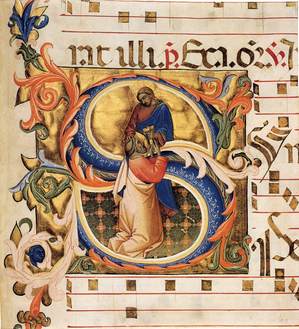
Jesus went into the region of Caesarea Philippi and he asked his disciples, "Who do people say that the Son of Man is?" They replied, "Some say John the Baptist, others Elijah, still others Jeremiah or one of the prophets." He said to them, "But who do you say that I am?" Simon Peter said in reply, "You are the Christ, the Son of the living God." Jesus said to him in reply, "Blessed are you, Simon son of Jonah. For flesh and blood has not revealed this to you, but my heavenly Father. And so I say to you, you are Peter, and upon this rock I will build my church, and the gates of the netherworld shall not prevail against it. I will give you the keys to the kingdom of heaven. Whatever you bind on earth shall be bound in heaven; and whatever you loose on earth shall be loosed in heaven." Then he strictly ordered his disciples to tell no one that he was the Christ. (Matthew 16 13-20)
A challenging gospel passage for people who are skeptical about Christ being THE Way, and giving the keys to Peter and thus to the Church. We have to ask ourselves: Who do you say Jesus is? Do you take His words seriously? Is Peter's confession of Jesus believable? Do you know the Church in a loving and faith-filled way?
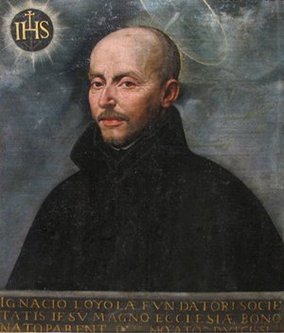 An often confused issue in Ignatian spirituality as it
is formulated by Saint Ignatius of Loyola is the concept of the magis. It can be an elusive but central Ignatian idea. But it doesn't have to be such. Many writers on Ignatian spirituality say that the magis means the best, the
highest, the most that we can do for God. But these writers miss the point because Ignatius doesn't speak in superlative terms.
An often confused issue in Ignatian spirituality as it
is formulated by Saint Ignatius of Loyola is the concept of the magis. It can be an elusive but central Ignatian idea. But it doesn't have to be such. Many writers on Ignatian spirituality say that the magis means the best, the
highest, the most that we can do for God. But these writers miss the point because Ignatius doesn't speak in superlative terms.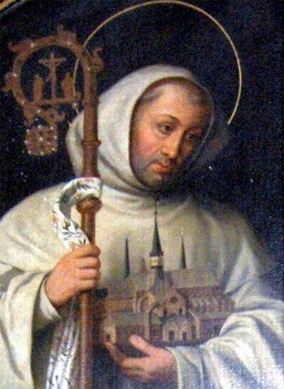 I consider that the blessing of a fuller sanctification
descended upon her [Mary, the Mother of God], so as not only to sanctify her birth, but also to keep her
life pure from all sin; which gift is believed to have been bestowed upon none
other born of woman. This singular privilege of sanctity, to lead her life
without any sin, entirely benefited the queen of virgins, who should bear the
Destroyer of sin and death, who should obtain the gift of life and
righteousness for all.
I consider that the blessing of a fuller sanctification
descended upon her [Mary, the Mother of God], so as not only to sanctify her birth, but also to keep her
life pure from all sin; which gift is believed to have been bestowed upon none
other born of woman. This singular privilege of sanctity, to lead her life
without any sin, entirely benefited the queen of virgins, who should bear the
Destroyer of sin and death, who should obtain the gift of life and
righteousness for all. Here are the central paragraphs the Pope addressed to women religious at the Escorial earlier today.
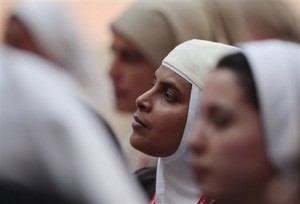
Dear Sisters, every charism is an evangelical word which the Holy Spirit recalls to the Church's memory (cf. Jn 14:26). It is not by accident that consecrated life "is born from hearing the word of God and embracing the Gospel as its rule of life. A life devoted to following Christ in his chastity, poverty and obedience becomes a living 'exegesis' of God's word... Every charism and every rule springs from it and seeks to be an expression of it, thus opening up new pathways of Christian living marked by the radicalism of the Gospel" (Verbum Domini, 83).
On the palne ride to Madrid for this year's World Youth Day, Pope Benedict fielded several questions from journalists. Here are three of the Q&A that I found interesting.
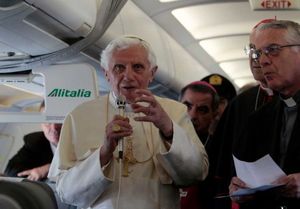
Question: What is the significance of these events in the pastoral "strategy" of the Universal Church in the third millennium?
Answer: Dear friends, greetings! I'm happy to go with you to Spain for this great event. After having personally experienced two WYD, I can only say that it was truly an inspiration that had been given to Pope John Paul II when he created the idea of a large gathering of young people and of the world with the Lord. I would say that these WYD are a signal, a cascade of light; they give visibility to the faith, of God's presence in the world, and thus foster the courage to be a believer. Believers often feel isolated in this world, almost lost. Here they see that they are not alone, that there is a large network of faith, a great community of believers in the world, that it is nice to live in this universal bond of friendship. And it is thus that I think friendships are born, friendships across the boundaries of different cultures and different countries. It is this birth of a universal network of friendship, which links the world and God, and is an important reality for the future of humanity and for the life of humanity today. Of course, World Youth Day cannot be an isolated incident: it is part of a larger journey, which has been prepared by the way of the Cross which has travelled to different countries already uniting young people in the sign of the Cross and the wonderful sign of the Virgin Mary. And thus it is that the preparation for World Youth Day is much more than the logistics of planning an event which naturally has many technical problems. It is requires an inner preparation, a willingness to join a path that brings us to others so that we can journey together towards God. And then, later, following the establishment of groups of friends, keeping this universal contact opens the borders of cultures, of human and religious differences, and continues a path which then leads to a new arrival point in a new WYD. It seems to me that the World Youth Day should be considered in this sense, as a sign, a part of a great journey, which creates friendships, open borders and demonstrates that is good to be with God, and that God is with us. In this sense, we want to continue with this great idea of Blessed Pope John Paul II.
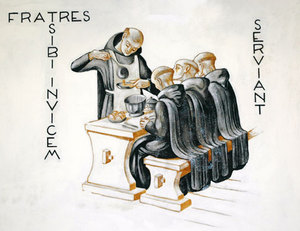
The daily grind makes us weary of the task at hand and sometimes we're also weary of the "nonsense" of other people. There are times in which we are just ugly. Our own fragile and sinful lives can get in the way of things. Sadly, sometimes we get hurt, and we hurt others.
I was re-reading parts of Luigi Giussani's Religious Sense this morning and then I saw that a friend made note of the Good zeal of monks (noted below) and I wondered... Why is it that we allow "wicked zeal of bitterness" to infiltrate our spirit and our relationships? Saint Benedict perceived a lack of coherence of what human beings say they believe and the lives lead. No doubt this same question/thought ought to concern every reasonable Christian if we are serious about faith in Jesus Christ and ultimate salvation. The tough thing about the Christian way of life is making sure that our faith informs our works and that we don't replace faith with good works thinking that what we do will absolve our poor behavior. The good zeal Benedict exhorts his monks to have is really applicable to all baptized Christians and not merely the "professional Christians."
Do we pay enough attention to reality? Am I too alienated from my own desires when I uncritically accept the ideas of others without doing the hard of work of verifying the truth of these ideas? Have I allowed wonder to take a back seat when looking at the reality I've been given by God? Have I sufficiently observed and understood what is in front of me? Have I love the Infinite, that is, the Triune God, to the best of my ability and without reservation? Where is my heart right now?
The Rule of Saint Benedict is insightful with regard to human nature: laziness, mediocrity, will not lead to ultimate happiness. That we have to put aside bitterness and that which does not build a deeper communion with God and neighbor. As Holy Father Saint Benedict and Father Luigi Giussani both said but in different ways: do we love?
Here is what the Rule of Saint Benedict says,
Just as there is a wicked zeal of bitterness which separates from God and leads to hell, so there is a good zeal which separates from evil and leads to God and everlasting life. This, then, is the good zeal which monks must foster with fervent love.... (72.1-3)
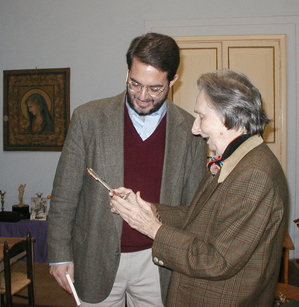
My sheep listen to my voice; I know them, and they follow me. I give them eternal life, and they shall never perish.
~John 10:27, 28
Life is a passage from the less to the more.
~Sofia Cavalletti, The Religious Potential of the Child, page 43
We have heard from [friends with the Catechesis of the Good Shepherd] in Rome that she had spent yesterday with Sofia who is now too weak even to speak. We would like to ask that everyone who has loved Sofia would pray for her now that she may continue to experience, in her body and her spirit, the peace and joy she has so often found in the atrium with the children. We praise God for the treasure she is for us and has illuminated for us in the child. We stand together in vigil and prayer, silently and at peace. Together may we pray the prayer Sofia herself has prayed with us this last year:
Lord, now you let your servant go in peace;
Your word has been fulfilled.
My eyes have seen the salvation
You have prepared in the sight of every people,
A light to reveal you to the nations and the glory of your people, Israel.
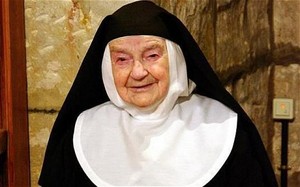 A Cistercian nun at 103 years, is leaving the monastery for the first time in 84 years to meet Pope Benedict while he's in Spain for World Youth Day.
A Cistercian nun at 103 years, is leaving the monastery for the first time in 84 years to meet Pope Benedict while he's in Spain for World Youth Day.

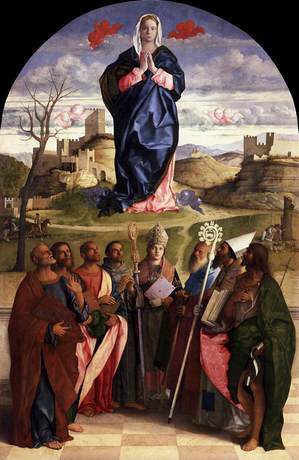 In the Ascension, the Lord, with His Resurrection, has
become the Master of the World. Therefore, there is One among us who will save
everything that we are, who is so powerful as to save our life, as to preserve
it entire in order to give it back to us whole by forgiving our sins. The
demonstration of this is the mystery of the Assumption, when He took Our Lady's
humanity and did not leave her in the clutches of death even for an instant.
In the Ascension, the Lord, with His Resurrection, has
become the Master of the World. Therefore, there is One among us who will save
everything that we are, who is so powerful as to save our life, as to preserve
it entire in order to give it back to us whole by forgiving our sins. The
demonstration of this is the mystery of the Assumption, when He took Our Lady's
humanity and did not leave her in the clutches of death even for an instant.Today's feast celebrates the ultimate fulfillment of Mary's journey as God's faithful and humble servant. As we reflect on this joyful feast, we hopefully realize that she is inviting us and teaching us to sing the Magnificat [the text for today's Gospel] along with her as we continue along our own journeys, however near or far the fulfillment of our journey remains. We too are invited to proclaim in joy and humble service the compassion and justice of our God. Today's feast assures us that like Mary, in serving the reign of God, we too will one day share in her destiny. (Father Damian, Abbot of Saint Joseph's Abbey, Spencer)
The Office of Readings leads us to shout for joy:
Dearest brethren, this is a time when all flesh should shout for joy, because the Mother of the Word made flesh is assumed into heaven; nor should human mortality desist from singing songs of praise on this glorious festival, when the nature of man is elevated in the Virgin to solitary eminence, high above all the orders of immortal spirits. (Saint Bernard, Second Nocturn)
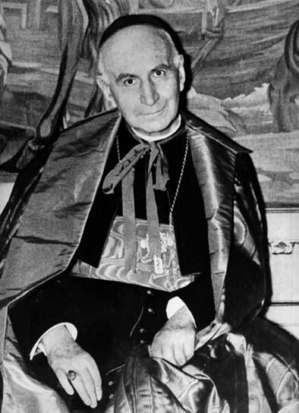 There's a journalist, intellectual, politician and a cardinal whose sanctity is being studied: Ángel Herrera Oria.
There's a journalist, intellectual, politician and a cardinal whose sanctity is being studied: Ángel Herrera Oria. Father Giussani spoke of sacrifice in our context as including what we do with our spare time. When we have time to spare, do we read, do we pray, do we spend quality time with family, friends, or our beloved, do we watch hours of TV, or, do we help the poor and needy? How we spend our free time reveals who we are as persons. How we use time speaks of our values and how we flourish.
Father Giussani spoke of sacrifice in our context as including what we do with our spare time. When we have time to spare, do we read, do we pray, do we spend quality time with family, friends, or our beloved, do we watch hours of TV, or, do we help the poor and needy? How we spend our free time reveals who we are as persons. How we use time speaks of our values and how we flourish. Today, the leaks replaced the cucumbers and the squash plants are growing daily.
Today, the leaks replaced the cucumbers and the squash plants are growing daily.
Image via Wikipedia
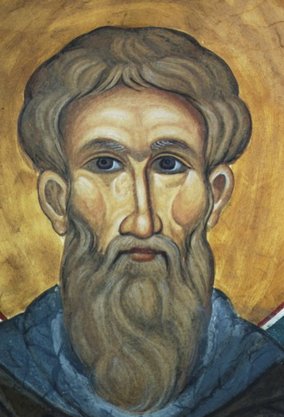
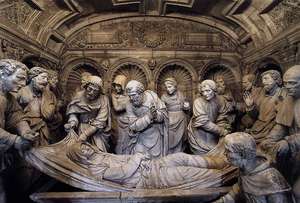 August 1 through 14 is a period of fasting in the
Byzantine churches in preparation for the feast of the Dormition of the
Theotokos (Assumption) on August 15.
August 1 through 14 is a period of fasting in the
Byzantine churches in preparation for the feast of the Dormition of the
Theotokos (Assumption) on August 15. I was reading Fr Tim Finigan's blog today, The hermeneutic of continuity, and was startled to read his post "Fr Z under attack." Apparently Dr. Phyllis Zagano, professor of Religion at Hofstra University, doesn't care for Fr Z's ecclesiology and liturgical theology. Actually, it's not Fr Z she has the problem with, it is the Church. But since she's can't get at that in manageable ways, she's going after a prominent priest-writer. Why does she really care about Fr Z???
The controversy is based on ruffled feathers: Dr Zagano and much of the NC Reporter crowd doesn't like to be scrutinized by those "who think with the Church." It seems to me that this is another example of the mentality where "authority (and obedience) is for other people"; remember, this way of judging things isn't really Catholic. The same doesn't accept fraternal correction or live in a spirit of obedience to the Holy Mother the Church (who might just know more than a mere individual expositor of religion). Clearly, this is a case of scratch a liberal find a fascist. In world where adults are expected to be mature, trying to dig up dirt so as incite scandal among the faithful has no place in the Church. Perhaps, it seems to me, that Dr Zagano has not really learned much from all the work she's done with the central spiritualities of the Church.
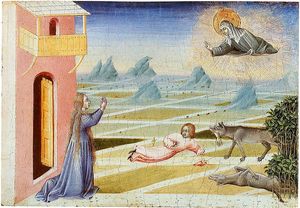 Today we observe the feast day of one the brilliant gems in the crown of Christ the King, Saint Clare of Assisi.
Today we observe the feast day of one the brilliant gems in the crown of Christ the King, Saint Clare of Assisi. 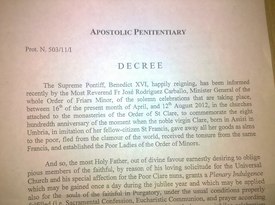
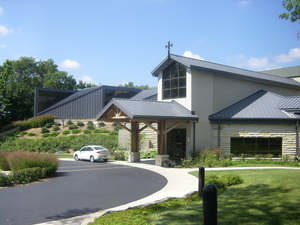
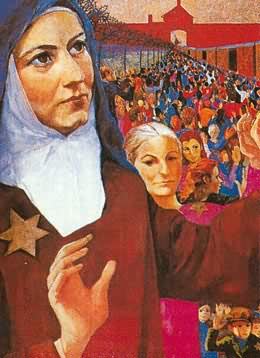
God of our Fathers, who brought the Martyr Saint Teresa Benedicta of the Cross to know Your crucified Son and to imitate him even until death, grant, through her intercession, that the whole human race may acknowledge Christ as its Savior and through him come to behold You for eternity.
"God Himself teaches us to go
forward with our hand in His by means of the Church's liturgy."
The 2010 blog post is here.
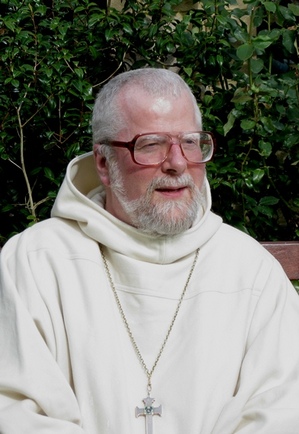 The Rt. Rev. Anselm Atkinson, OSB until now the
Superior of St. Mary's Monastery, Petersham, MA (for the last 21 years) and Abbot-Visitor for the
English speaking province of the Subiaco Congregation of the Order of St.
Benedict has been elected as the third Abbot of Petersham's motherhouse and the
monastery of his profession (1976) and priest in 1982, Pluscarden Abbey in Scotland. Pluscarden was refounded in 1948.
The Rt. Rev. Anselm Atkinson, OSB until now the
Superior of St. Mary's Monastery, Petersham, MA (for the last 21 years) and Abbot-Visitor for the
English speaking province of the Subiaco Congregation of the Order of St.
Benedict has been elected as the third Abbot of Petersham's motherhouse and the
monastery of his profession (1976) and priest in 1982, Pluscarden Abbey in Scotland. Pluscarden was refounded in 1948.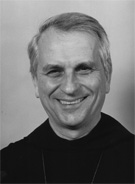 Abbot Vincent de Paul Bataille, emeritus abbot of
Marmion Abbey, was elected for six-year term by the capitulars of the 44th General Congregation Swiss American Congregationon Monday, August 8, 2011. As the new Abbot President he'll over see certain parts of the monastic life of little more than a dozen monasteries (see a previous blog post).
Abbot Vincent de Paul Bataille, emeritus abbot of
Marmion Abbey, was elected for six-year term by the capitulars of the 44th General Congregation Swiss American Congregationon Monday, August 8, 2011. As the new Abbot President he'll over see certain parts of the monastic life of little more than a dozen monasteries (see a previous blog post).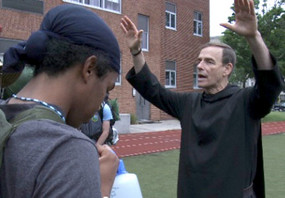 The Newark, New Jersey colony of Benedictine monks have been involved with the teaching of youth and parish work since their founding in 1857. The monks, priests and brothers, live a life of prayer, work within the context of the fraternal life that engages one's freedom to serve the Lord in unique ways.
The Newark, New Jersey colony of Benedictine monks have been involved with the teaching of youth and parish work since their founding in 1857. The monks, priests and brothers, live a life of prayer, work within the context of the fraternal life that engages one's freedom to serve the Lord in unique ways.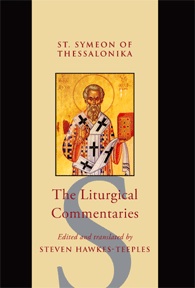
I am happy to recommend my friend's recently published book, The Liturgical Commentaries of St Symeon of Thessalonika.
From the book:
This volume contains an edition and facing English translation of Explanation of the Divine Temple and "On the Sacred Liturgy," the two commentaries on the pontifical (hierarchal) Byzantine Divine Liturgy by St. Symeon of Thessalonika (†1429). This edition is based on MS Zagora 23, which contains extensive corrections and additions apparently added to the text by the author himself. The book opens with a historical and theological foreword on liturgical commentaries and mystagogy by Archimandrite Robert Taft. The introduction surveys the life and career of St. Symeon, analyzes the structure and theology of the commentaries, and concludes with an account of technical and editorial questions. The index includes references to names, places, and topics in Symeon's text and in the introduction and traces key terms in the commentaries in both Greek and English.
A review:

With this book Fr.
Steven Hawkes-Teeples, SJ, Professor of Byzantine Liturgy at the Pontifical
Oriental Institute in Rome, fills a gaping hole in the scholarly literature
associated with the overlapping academic fields of Byzantine Studies, Medieval
Studies, Orthodox Theology, and Oriental Liturgiology. The present volume
represents the first translation into any modern western academic language of
both commentaries of St. Symeon of Thessalonika (d. 1429) on the Byzantine
Divine Liturgy or Eucharist. Such neglect is surprising, for St. Symeon is an
author of the first importance. As the last and most prolific Orthodox
liturgical theologian of the Byzantine era, who lived at the point when the
Byzantine Empire was moving toward its demise before the Ottoman onslaught, he
crowns and closes his era. -- Robert F. Taft

 The first reading from today's Scripture readings at Mass call us to reflect on how Revelation is made known to us; in what ways do we meet God? How are we to understand the teachings of the many saints and others who have claimed to have encountered God? Knowing who are true visionaries is rather difficult, I have to say, and some are even frauds. The credibility of the witness is so crucial here since we only have indirect knowledge of God because only Jesus' Mother (and family) and apostles had direct experience of Him, how can we talk about an encounter with the Lord. One way to wrap our minds around meeting the Divine Majesty is to listen, in part, to Father Benedict Groeshel:
The first reading from today's Scripture readings at Mass call us to reflect on how Revelation is made known to us; in what ways do we meet God? How are we to understand the teachings of the many saints and others who have claimed to have encountered God? Knowing who are true visionaries is rather difficult, I have to say, and some are even frauds. The credibility of the witness is so crucial here since we only have indirect knowledge of God because only Jesus' Mother (and family) and apostles had direct experience of Him, how can we talk about an encounter with the Lord. One way to wrap our minds around meeting the Divine Majesty is to listen, in part, to Father Benedict Groeshel:The best lesson one may learn from these authenticated and canonized visionaries is to do what you are supposed to do and leave the rest to God. The fulfillment of duty is the guiding principle of any decent moral life, in any religion of the world, because it expresses the natural law and is completely consistent with the revealed law of God. The fulfillment of duty placed before us by the providential circumstances of life, as we are guided by the commandments and the teaching of the gospel, is the straight road to God. Along that road any valid religious experience which occurs may be useful.
God launches us into life's adventure with the grace needed to succeed, Father Julián Carrón reminds
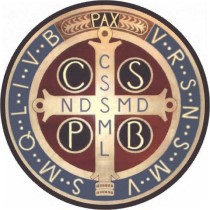 Today begins the 44th General Chapter of the Swiss American Benedictine Congregation. The ruling abbots and conventual priors with elected delegates will be at Westminister Abbey in Mission British Columbia, Canada.
Today begins the 44th General Chapter of the Swiss American Benedictine Congregation. The ruling abbots and conventual priors with elected delegates will be at Westminister Abbey in Mission British Columbia, Canada.As Catholic grammar school student I was introduced to the Sacred Heart of Jesus by the Nazareth sisters. Everyday we said a prayer to the Sacred Heart and we did the Litany to the Sacred Heart yearly in church. To me it was normal; the image of the heart outside the body was at first weird but in became indicative. Over time I realized that others had no idea of God's unconditional love. My devotion to the Sacred Heart grew as time went on; my religious practice was helped by reading a bit of history and my friend Dom Ambrose who wrote his license thesis on St Gertrude's teaching of the Sacred Heart. Also, that first Friday devotion of Saint Margaret Mary Alacoque, like many, would relish in observing the First Friday with Mass, and hopefully confession if I could find a priest. The organizers of the World Youth Day captured part of Spanish religious and civil history by making a connection with proposing an Act of Consecration to the Sacred Heart of Jesus to all the participants. What a great idea!!! This is a yet another concrete way to be "planted and built up in Jesus Christ, firm in the faith." What follows is merely an interesting paragraph from the catechesis prepared for the WYD; you can read the preparatory Catechesis here. Today, and certainly during the WYD, make an offering of yourself to your Lord and Savior.
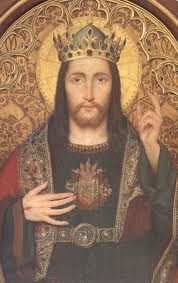 This search of man's heart ends when one discovers God's Heart. On this topic, St. Augustine says: "You made us for yourself, Oh God, and our heart is restless until it rests in you". The concern to which St. Augustine refers is the difficulty we all have in attaining true Love as a consequence of our condition of creatures; we are finite; moreover, we are sinners. Over and over again we run into the difficulty of our selfishness, the chaos of our passions, that throws away this true Love. Man's heart "needs" a heart at his same level, a heart that can enter into his history, and, on the other hand, an "all-powerful" heart that can take him out of his limitations and sins. We can say that In Jesus Christ, God has met mankind and has loved us with a "human heart". In the encounter of man's heart with the Sacred Heart of Jesus, the mystery of salvation becomes real. "In fact, from the infinite horizon of his love, God wished to enter into the limits of human history and the human condition. He took on a body and a heart. Thus, we can contemplate and encounter the infinite in the finite, the invisible and ineffable Mystery in the human Heart of Jesus, the Nazarene" (Benedict XVI, Angelus, 1/VI/2008)
This search of man's heart ends when one discovers God's Heart. On this topic, St. Augustine says: "You made us for yourself, Oh God, and our heart is restless until it rests in you". The concern to which St. Augustine refers is the difficulty we all have in attaining true Love as a consequence of our condition of creatures; we are finite; moreover, we are sinners. Over and over again we run into the difficulty of our selfishness, the chaos of our passions, that throws away this true Love. Man's heart "needs" a heart at his same level, a heart that can enter into his history, and, on the other hand, an "all-powerful" heart that can take him out of his limitations and sins. We can say that In Jesus Christ, God has met mankind and has loved us with a "human heart". In the encounter of man's heart with the Sacred Heart of Jesus, the mystery of salvation becomes real. "In fact, from the infinite horizon of his love, God wished to enter into the limits of human history and the human condition. He took on a body and a heart. Thus, we can contemplate and encounter the infinite in the finite, the invisible and ineffable Mystery in the human Heart of Jesus, the Nazarene" (Benedict XVI, Angelus, 1/VI/2008)
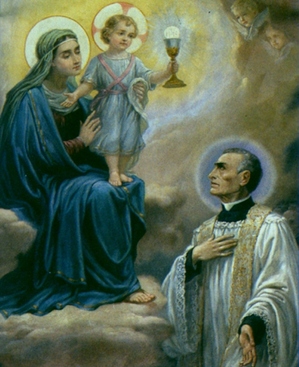 Gracious God of our ancestors, You led Peter Julian Eymard, like Jacob in times past, on a journey of faith. Under the guidance of Your gentle Spirit, Peter Julian discovered the gift of love in the Eucharist which Your Son Jesus offered for the hungers of humanity. Grant that we may celebrate this mystery worthily, adore it profoundly, and proclaim it prophetically for Your greater glory. Amen.
Gracious God of our ancestors, You led Peter Julian Eymard, like Jacob in times past, on a journey of faith. Under the guidance of Your gentle Spirit, Peter Julian discovered the gift of love in the Eucharist which Your Son Jesus offered for the hungers of humanity. Grant that we may celebrate this mystery worthily, adore it profoundly, and proclaim it prophetically for Your greater glory. Amen.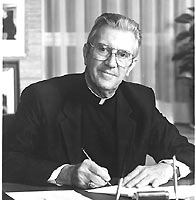 Today is the 20th anniversary of death of The Most Reverend John Francis Whealon, STL, the sometime Archbishop of Hartford. He served as the archbishop from 1968 till his sudden death in 1991. For me, Archbishop Whealon was a model priest and a somewhat iconic figure in Connecticut.
Today is the 20th anniversary of death of The Most Reverend John Francis Whealon, STL, the sometime Archbishop of Hartford. He served as the archbishop from 1968 till his sudden death in 1991. For me, Archbishop Whealon was a model priest and a somewhat iconic figure in Connecticut.Carindal Stanisław Ryłko, 66, President of the Pontifical Council for the Laity, wrote a brief editorial on the contours of the new evangelization. In 2012, there will be another Synod of Bishops' meeting with the new evangelization as it's central topic. He's helping to focus our attention on the exhortation of Jesus to spread the Kingdom of God. A mere two paragraphs follow, but you can read the entire editorial here.
As is known, the idea is not new: the entire pontificate of Blessed John Paul II was characterized by the leit-motiv of the new evangelization. Pope John Paul II did not fail to explain to us what he intended when he placed the adjective "new" in front of the traditional term, "evangelization": new in ardor, new in methods, new in expressions. For an appropriate and faithful understanding of the contents of the Lineamenta, one needs to have an adequate key for reading the text. The expression, "new evangelization," in fact, has become so common - even abused - that we run the risk of distorting its sense, or worse, reducing it to an insignificant slogan. The heart of the question of the new evangelization, writes the Cardinal, is the centrality of God in our lives.
 The Dominican nuns at Our Lady of Grace Monastery (North Guilford, CT) lost their barn this past winter with the constant snow fall. The old barn collapsed under the weight of lots of snow --it's poor, old legs couldn't bear the torment of heavy snow and ice. But the monastery needs a barn.
The Dominican nuns at Our Lady of Grace Monastery (North Guilford, CT) lost their barn this past winter with the constant snow fall. The old barn collapsed under the weight of lots of snow --it's poor, old legs couldn't bear the torment of heavy snow and ice. But the monastery needs a barn.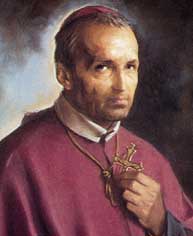
Image via Wikipedia
Saint Alphonsus, born in 1696, a lawyer by 20. ordained priest in 1726, a founder of a religious congregation of priests and brothers, a bishop, an author and a Doctor of the Church, is remembered today's at Mass.
Perhaps he's best known for founding the Congregation of the Most Holy Redeemer - better known as the Redemptorists - in 1732 with official papal approval in 1749. The Redemptorists were did missionary work, taught catechism and gave retreats; they concentrated mostly on the country side for their spiritual labors.
It is true that you can't force a sacrament on someone and that one's perfect freedom has to be respected, history tells us that Alphonsus was forced against his own will, to be the bishop of Naples' small Diocese of St. Agatha in 1762, a ministry he exercised for 13 years. During these years he set about correcting liturgical abuses and other such things, reformed the seminary, sent priests to be missionaries, and helped the poor.
On August 1, 1787, at Pagani, Alphonsus Liguori died at mid-day, as the bells were calling the faithful to pray the Angelus.
In 1839, Alphonsus was canonized and and the Magisterium declared him to be a Doctor of the Church in 1871.As an author, Alphonsus published more than 100 books, including The Glories of Mary, Preparation for Death, and The Passion and the Death of Jesus Christ.
The Redemptorists have a US province.
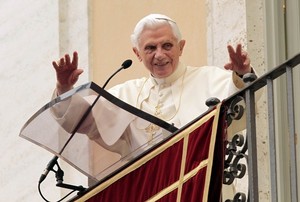 One of the Holy Father's August prayer intentions
is to step up an intense spiritual closeness with the Holy Spirit's outpouring of
grace for the World Youth Day due to begin in 3 weeks (August 16-21).
Apparently many records are being broken for participation and programming.
Unite yourself to the Pope's prayer for the youth....
One of the Holy Father's August prayer intentions
is to step up an intense spiritual closeness with the Holy Spirit's outpouring of
grace for the World Youth Day due to begin in 3 weeks (August 16-21).
Apparently many records are being broken for participation and programming.
Unite yourself to the Pope's prayer for the youth.... 